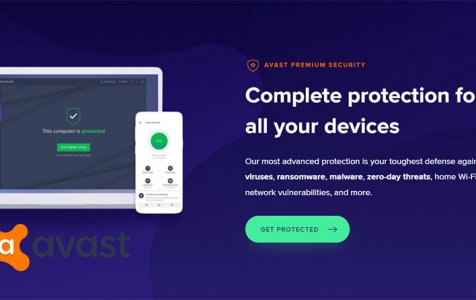The internet has challenges with entities seeking to access and misuse sensitive data. In the end, our hopes rely on security tools that promise to keep us safe from cyber criminals.
That is the case with Avast Antivirus. It gained popularity as a trusted security tool with millions of users, but later faced controversies over its data handling practices. This scandal was revealed when both Google and Mozilla dropped Avast’s web extension.
In their defense, Avast claimed the data sold had been de-identified, hence securing user privacy. However, based on our experts’ analysis, de-identified data can still be linked to actual identities. Before diving deep into the matter, let’s first understand what is Avast?
About Avast Antivirus
Avast is a computer security tool that was founded back in 1988 and has managed to rack over 430 million monthly users. The company ranks second in claiming the largest market share in the security industry. Avast Antivirus is sold using a freemium model whereby users receive basic endpoint protection features at no cost. To have access to advanced features, users have to pay for a premium version.
Expert Tip: For smoother PC performance, consider using a PC optimization tool. It handles junk files, incorrect settings, and harmful apps. Make sure it's right for your system, and always check the EULA and Privacy Policy.
Special offer. About Outbyte, uninstall instructions, EULA, Privacy Policy.
This mini security suite comes with an unlimited password manager on its free version. It also has a silent gaming mode. Although light, it takes time to complete a full system scan compared to other leading competitors in the industry. Worse, it can slow down your system performance when executing scans, limiting other activities.
Avast Antivirus Review
Now, back to the highlight of the story, as indicated above, Avast claimed to have stripped any identifying details before selling its users’ browsing history. Based on this explanation, some might perceive the act as not harmful. Unfortunately, a huge amount of anonymized browser history information can be broken down and connected to actual users.
The division held liable for selling data to third-parties is the company’s subsidiary Jumpshot. Data is sold to big brands so they can study consumer behavior when buying online to come up with compelling ads. The collected data is spot on, such that the big brands obtaining it can learn about each click made by the consumer from their browsing history.
Despite Avast claiming that they strip off the user’s identity details, the remaining information is linked to the user’s device ID. Now, using this device ID, big companies such as Amazon can track it back to the actual owner, hence managing to identify the user.
Apart from the controversy, some users find Avast’s security performance not as efficient. Some users might prefer using the built-in MS Windows Defender. Although the company claims to have stopped collecting data, rebuilding trust can be challenging, and some users have learned to be cautious with free products.
How to Use Avast Antivirus
Avast Antivirus is only available to MS Windows platforms. It is compatible with Windows 7, 8.1, and 10. If you are still on XP, you can roll back to Avast’s older version, but you won’t have access to the latest features. Apart from the drawbacks, we have been mentioning, the upside of this tool is that it comes with additional features that are not found in other free antivirus tools such as a silent gaming mode, scanner for Wi-Fi network, and an unlimited password manager that allows as many entries as one wishes.
Avast has a paid version as well, with the cheapest capped at $60 per year for a single device or $80 per year covering up to 10 devices. The paid version is available to Windows, Mac, and Android platforms. The Avast Premium Security version comes with these extra features:
- Appends Firewall
- File shredder
- Automated software update
- Webcam protection
- Spam defense
- Vault for storing essential files
Next in line is Avast Ultimate version which costs $100 for a single device. This version has impressive premium features which include Cleanup, Password manager, as well as SecureLine VPN. When purchased separately, these could cost up to $130.
How Does Avast Antivirus Protection Work?
The tool scans your system and compares all files and apps to a database of common malicious software. This database is constantly updated to ensure it keeps up with the latest malware threats. During the comparison, the program aims to identify telltale symptoms of an infection. Any suspicious files or apps found are uploaded to the lab for further analysis.
Avast shares the lab used by to examine malware with AVG; a sister company to the brand. However, independent lab tests have revealed that although the lab delivers acceptable results, malware protection is just mediocre.
Avast also scans external drives such as USBs. The browser extension of Avast security tool must be downloaded separately. It helps protect users against malicious sites as well as trackers and webmail attachments.
Avast Antivirus Pros and Cons
We can’t expect a free version of software to be perfect considering that they are also offering a paid one. This is a strategy used by most brands, delivering a half-cooked freemium to encourage users into purchasing the paid version.
However, given the importance of ethics in the security industry, Avast faced criticisms for its data handling practices. Therefore, those who prioritize internet privacy might want to explore other options. We suggest exploring other protection software that has received positive feedback in the security industry. Regardless, let’s take a look at some of the pros and cons attached to the Avast security product:
Pros
- Password manager and Wi-Fi scanner available for free
- Personalized protection
Cons
- Slows down the system when performing scans
- Scans take long to complete
- Bad reputation having sold users’ data to third-parties
